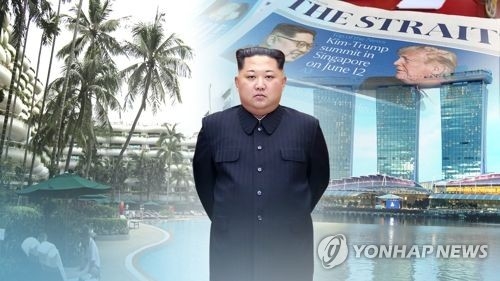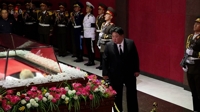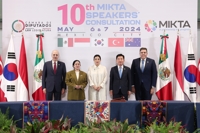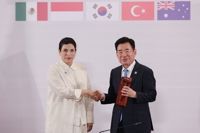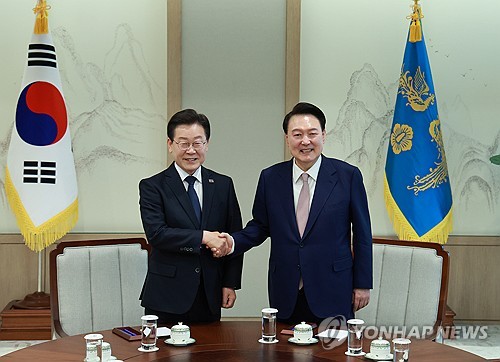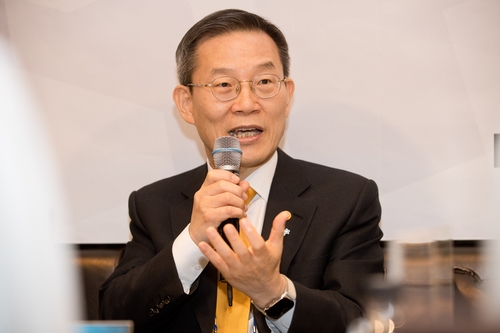(News Focus) N. Korea's angry reactions portend tough negotiations ahead
SEOUL, May 16 (Yonhap) -- Through its latest bouts of anger, North Korea appears to have shown it is set to drive a hard bargain with the United States over its regime security and economic benefits in return for denuclearization steps, analysts said Wednesday.
Early in the day, the communist state abruptly suspended the high-level inter-Korean talks planned for Wednesday in protest against the ongoing Seoul-Washington air drills, and even threatened to rethink the June 12 summit with the U.S. in Singapore.
The move raised fears of a possible retreat from Pyongyang's peace offensive, but analysts called it a strategic attempt to raise its bargaining power and a reiteration of what concessions it seeks to wring out from Washington and Seoul.
"It was apparently intended to help the North secure the high ground in the denuclearization talks, particularly regarding the core issue of a guarantee for regime security," Park Won-gon, a security expert at Handong Global University, told Yonhap News Agency.
"After all, the North is thinking of two major issues, namely the military drills and Washington's deployment of strategic assets to the peninsula. It wants to address the issues rather than spoiling the momentum for talks," he added.
The ongoing Max Thunder exercise between the allies' air forces, which runs until May 25, involves the deployment of 100 aircraft, including such U.S. strategic assets as eight F-22 radar-evading fighter jets.
Though Pyongyang called the drills a rehearsal for invasion and a provocation, the allies decided to press ahead with the "defensive" exercise.
The North's angry protest at the drills came as a surprise, as early this year, North Korean leader Kim Jong-un showed his "understanding" for the allied exercises, which many in the South took as a subtle shift in his stance towards the regular combined maneuvers.
Conservatives here have maintained that combined drills, including the summertime Ulchi Freedom Guardian, must not be up for negotiations, as they form an integral part of the Seoul-Washington alliance. But others argue that their size and frequency can be recalibrated to give impetus to the ongoing peace efforts.
Koh Yu-hwan, a professor of North Korean studies at Dongguk University, said that the allied drills might have infuriated the North, as it wanted to see their suspension following a set of earlier steps by it to freeze nuclear and long-range missile tests and a decision to dismantle its monumental nuclear test site.
"Pyongyang appears to believe that even though it has taken its own unilateral measures to put a moratorium on nuclear tests and dismantle the test site -- all intended to build trust -- there hasn't been any change in the stances of Seoul and Washington," Koh said.
"As the negotiation phase has just started, Pyongyang may not want to break out of it, but its move to cancel the cross-border talks may be a reaffirmation of its basic stance that it will not accede to any 'mortifying' mode of negotiations," he added.
Following the North's announcement about the suspended inter-Korean talks, its Vice Foreign Minister Kim Kye-gwan floated the possibility of reconsidering the planned summit between U.S. President Donald Trump and North Korean leader Kim.
The vice minister also said that the North is "not interested" in talks that force the "unilateral" renunciation of its nuclear program.
In the weeks ahead of the Trump-Kim summit, senior Washington officials have indicated that the U.S. favors a swift and stringent denuclearization process, as well as the dismantlement of the North's ballistic missile program and chemical and biological weapons, while holding out the prospect of economic prosperity that would follow its complete denuclearization.
This might have unnerved the North, which has publicly stated its preference for a "phased and synchronous" method. Skeptics argue the North's approach would mean a protracted process under which Pyongyang seeks rewards for each piecemeal step towards denuclearization.
"During the preparations for the North-U.S. summit, the U.S. has pressured the North to remove its nukes ... dismantle other weapons and improve human rights. Thus, the North, in a sense, used the suspension of the inter-Korean talks to show its discontent," Shin Beom-chul, a senior fellow at the Asan Institute for Policy Studies, said.
sshluck@yna.co.kr
(END)
-
 BTS' RM to prerelease 'Come Back to Me,' music video directed by Lee Jung-jin of 'Beef'
BTS' RM to prerelease 'Come Back to Me,' music video directed by Lee Jung-jin of 'Beef' -
 Disney+ 'Uncle Samsik' aims to provoke thought with ambitious characters in turbulent times
Disney+ 'Uncle Samsik' aims to provoke thought with ambitious characters in turbulent times -
 N. Korea dismantles S. Korean building near shuttered Kaesong complex
N. Korea dismantles S. Korean building near shuttered Kaesong complex -
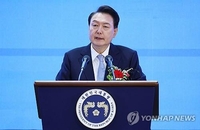 Yoon pledges to increase monthly senior basic pension benefit
Yoon pledges to increase monthly senior basic pension benefit -
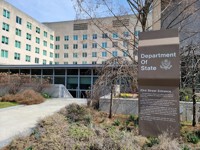 (Yonhap Interview) U.S. will do 'all' it can to back S. Korea in case of China's economic coercion: official
(Yonhap Interview) U.S. will do 'all' it can to back S. Korea in case of China's economic coercion: official
-
 BTS' RM to prerelease 'Come Back to Me,' music video directed by Lee Jung-jin of 'Beef'
BTS' RM to prerelease 'Come Back to Me,' music video directed by Lee Jung-jin of 'Beef' -
 Disney+ 'Uncle Samsik' aims to provoke thought with ambitious characters in turbulent times
Disney+ 'Uncle Samsik' aims to provoke thought with ambitious characters in turbulent times -
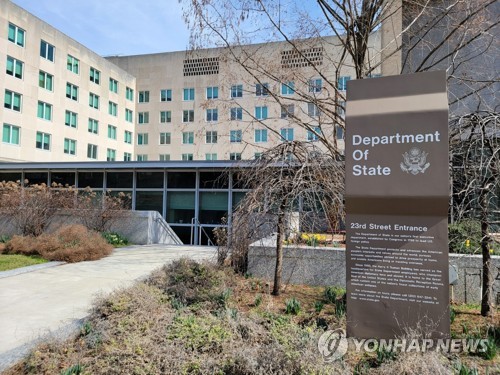 (Yonhap Interview) U.S. will do 'all' it can to back S. Korea in case of China's economic coercion: official
(Yonhap Interview) U.S. will do 'all' it can to back S. Korea in case of China's economic coercion: official -
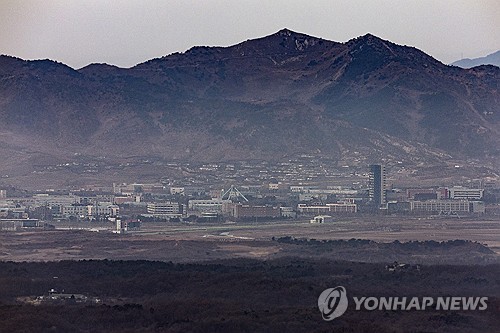 N. Korea dismantles S. Korean building near shuttered Kaesong complex
N. Korea dismantles S. Korean building near shuttered Kaesong complex -
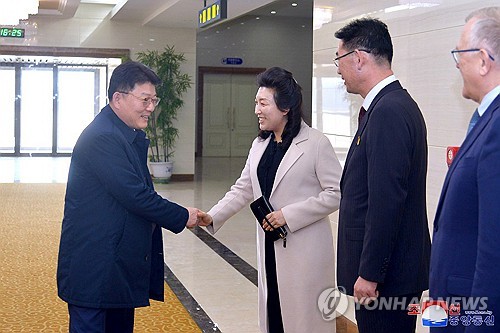 N. Korean economic delegation returns from Iran amid suspected military ties
N. Korean economic delegation returns from Iran amid suspected military ties
-
 BTS' RM to prerelease 'Come Back to Me,' music video directed by Lee Jung-jin of 'Beef'
BTS' RM to prerelease 'Come Back to Me,' music video directed by Lee Jung-jin of 'Beef' -
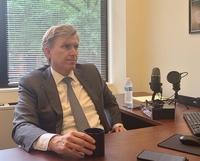 (Yonhap Interview) Ex-Pentagon official stresses need for war plan rethink, swift OPCON transfer, USFK overhaul
(Yonhap Interview) Ex-Pentagon official stresses need for war plan rethink, swift OPCON transfer, USFK overhaul -
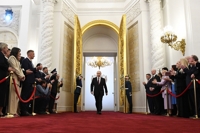 Top S. Korean envoy to Russia attends Putin's inauguration ceremony: Seoul official
Top S. Korean envoy to Russia attends Putin's inauguration ceremony: Seoul official -
 Foreign medical license holders to practice medicine in S. Korea amid prolonged doctors' walkout
Foreign medical license holders to practice medicine in S. Korea amid prolonged doctors' walkout -
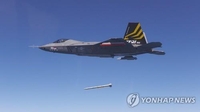 KF-21 fighter jet prototype to conduct 1st Meteor missile test
KF-21 fighter jet prototype to conduct 1st Meteor missile test
